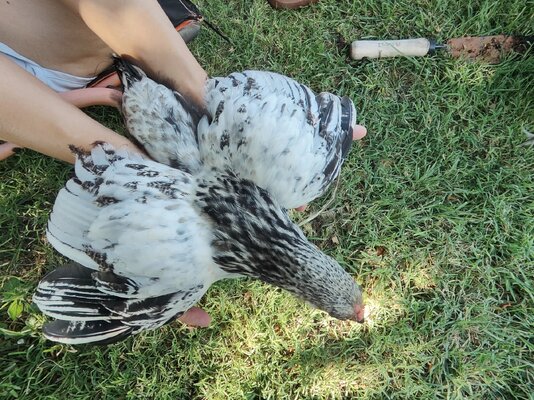I see a lot of pictures journals and so instead of posting a "look at this pretty pattern!" I figured I would start one.
We are lucky because we are largely in this for meat chickens, but wanted to experience chicken meat that would be more likely to be found in other countries, or, less likely to be Cornish cross types. Though we did get some Cornish crosses given to us by someone who didn't know what they were and when they found out were horrified. I'm guessing they wanted egg chickens
Luckily, I'm in an area where there's a fair amount of backyard and rural chicken keepers so while some of ours will definitely become food, there's definitely interest in some of them when some turn out to be roosters. It's been cool getting to know locals and seeing what they really like about their flocks and what they gravitate towards.
We have a collection of chicks, all 10 weeks or younger (yes we are preparing for all the roosters. We had some early crowers around 6 weeks. Luckily the flock-master the eggs came from was very, very desirous of having them because he loves splash patterns (or simply got sick of all the mostly-black chicks they'd hatched out from this season's black brahmas. Seems they out performed the Easter Egger rooster, but the two early crowers were from the EE rooster.)
We have an errant Cornish cross hen, a wayward Brahma rooster that was supposed to be dinner but he's so chill that except for having to readjust his crow collar he's largely become part of the background (he's crap at looking for predators though. He's rather take an afternoon nap with the babies under the jeep,) some silkies, EE or Brahma crosses, Anconas, black-crested blue polish, Barred Hollands, American Bresse, Mottled Java, Gold Spangled Hamburg, a mix of half blue-laced Red wyandottes (a bunch of different hens but only one rooster,) and if this next batch goes well, Muscovy ducks, a lone Pekin duck, and a bunch of supposedly show quality silkies (some containing the frizzle gene, which one of the locals is looking for) because the price for eggs was 75% off since it was too hot to ship eggs.
All that being said, I wanted to show how pretty this half blue-laced Red Wyandotte's feathers are coming in. There is a second, very similar looking one and they both came from the darkest eggs. So it's possible the hen was copper black Marans (which the local had in her flock) but it's weird this is how the mix would show. So maybe that was the hen type, maybe not.
We are lucky because we are largely in this for meat chickens, but wanted to experience chicken meat that would be more likely to be found in other countries, or, less likely to be Cornish cross types. Though we did get some Cornish crosses given to us by someone who didn't know what they were and when they found out were horrified. I'm guessing they wanted egg chickens

Luckily, I'm in an area where there's a fair amount of backyard and rural chicken keepers so while some of ours will definitely become food, there's definitely interest in some of them when some turn out to be roosters. It's been cool getting to know locals and seeing what they really like about their flocks and what they gravitate towards.
We have a collection of chicks, all 10 weeks or younger (yes we are preparing for all the roosters. We had some early crowers around 6 weeks. Luckily the flock-master the eggs came from was very, very desirous of having them because he loves splash patterns (or simply got sick of all the mostly-black chicks they'd hatched out from this season's black brahmas. Seems they out performed the Easter Egger rooster, but the two early crowers were from the EE rooster.)
We have an errant Cornish cross hen, a wayward Brahma rooster that was supposed to be dinner but he's so chill that except for having to readjust his crow collar he's largely become part of the background (he's crap at looking for predators though. He's rather take an afternoon nap with the babies under the jeep,) some silkies, EE or Brahma crosses, Anconas, black-crested blue polish, Barred Hollands, American Bresse, Mottled Java, Gold Spangled Hamburg, a mix of half blue-laced Red wyandottes (a bunch of different hens but only one rooster,) and if this next batch goes well, Muscovy ducks, a lone Pekin duck, and a bunch of supposedly show quality silkies (some containing the frizzle gene, which one of the locals is looking for) because the price for eggs was 75% off since it was too hot to ship eggs.
All that being said, I wanted to show how pretty this half blue-laced Red Wyandotte's feathers are coming in. There is a second, very similar looking one and they both came from the darkest eggs. So it's possible the hen was copper black Marans (which the local had in her flock) but it's weird this is how the mix would show. So maybe that was the hen type, maybe not.
Attachments
-
 Screenshot_2025-07-08-23-17-43-36_92460851df6f172a4592fca41cc2d2e6.jpg177.5 KB · Views: 42
Screenshot_2025-07-08-23-17-43-36_92460851df6f172a4592fca41cc2d2e6.jpg177.5 KB · Views: 42 -
 Screenshot_2025-07-08-23-16-28-45_92460851df6f172a4592fca41cc2d2e6.jpg237.4 KB · Views: 16
Screenshot_2025-07-08-23-16-28-45_92460851df6f172a4592fca41cc2d2e6.jpg237.4 KB · Views: 16 -
 Screenshot_2025-07-08-23-16-40-57_92460851df6f172a4592fca41cc2d2e6.jpg154.2 KB · Views: 21
Screenshot_2025-07-08-23-16-40-57_92460851df6f172a4592fca41cc2d2e6.jpg154.2 KB · Views: 21 -
 Screenshot_2025-07-08-23-16-15-20_92460851df6f172a4592fca41cc2d2e6.jpg210.9 KB · Views: 16
Screenshot_2025-07-08-23-16-15-20_92460851df6f172a4592fca41cc2d2e6.jpg210.9 KB · Views: 16 -
 Screenshot_2025-07-08-23-16-03-98_92460851df6f172a4592fca41cc2d2e6.jpg195.9 KB · Views: 18
Screenshot_2025-07-08-23-16-03-98_92460851df6f172a4592fca41cc2d2e6.jpg195.9 KB · Views: 18 -
 IMG20250708175859.jpg772.8 KB · Views: 19
IMG20250708175859.jpg772.8 KB · Views: 19 -
 IMG20250708175908.jpg865.7 KB · Views: 21
IMG20250708175908.jpg865.7 KB · Views: 21 -
 IMG_20250708_232003.jpg1.3 MB · Views: 25
IMG_20250708_232003.jpg1.3 MB · Views: 25





